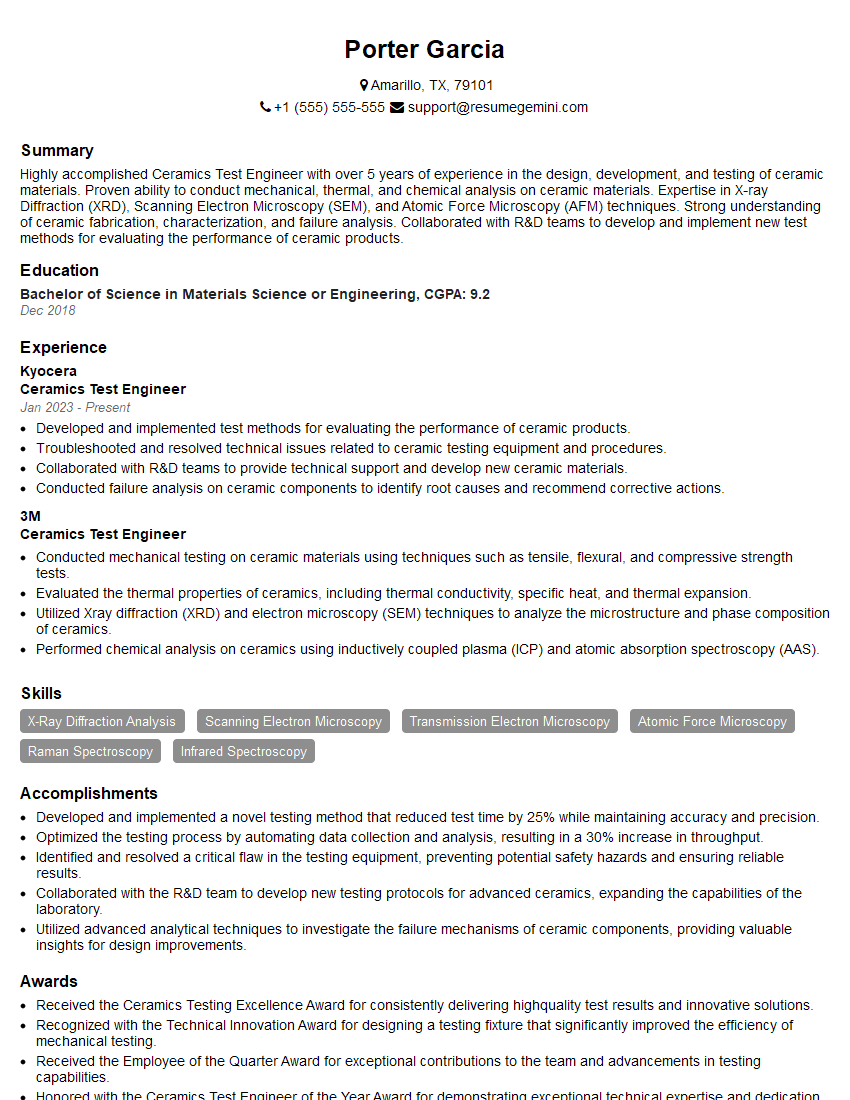Are you a seasoned Ceramics Test Engineer seeking a new career path? Discover our professionally built Ceramics Test Engineer Resume Template. This time-saving tool provides a solid foundation for your job search. Simply click “Edit Resume” to customize it with your unique experiences and achievements. Customize fonts and colors to match your personal style and increase your chances of landing your dream job. Explore more Resume Templates for additional options.

Porter Garcia
Ceramics Test Engineer
Summary
Highly accomplished Ceramics Test Engineer with over 5 years of experience in the design, development, and testing of ceramic materials. Proven ability to conduct mechanical, thermal, and chemical analysis on ceramic materials. Expertise in X-ray Diffraction (XRD), Scanning Electron Microscopy (SEM), and Atomic Force Microscopy (AFM) techniques. Strong understanding of ceramic fabrication, characterization, and failure analysis. Collaborated with R&D teams to develop and implement new test methods for evaluating the performance of ceramic products.
Education
Bachelor of Science in Materials Science or Engineering
December 2018
Skills
- X-Ray Diffraction Analysis
- Scanning Electron Microscopy
- Transmission Electron Microscopy
- Atomic Force Microscopy
- Raman Spectroscopy
- Infrared Spectroscopy
Work Experience
Ceramics Test Engineer
- Developed and implemented test methods for evaluating the performance of ceramic products.
- Troubleshooted and resolved technical issues related to ceramic testing equipment and procedures.
- Collaborated with R&D teams to provide technical support and develop new ceramic materials.
- Conducted failure analysis on ceramic components to identify root causes and recommend corrective actions.
Ceramics Test Engineer
- Conducted mechanical testing on ceramic materials using techniques such as tensile, flexural, and compressive strength tests.
- Evaluated the thermal properties of ceramics, including thermal conductivity, specific heat, and thermal expansion.
- Utilized Xray diffraction (XRD) and electron microscopy (SEM) techniques to analyze the microstructure and phase composition of ceramics.
- Performed chemical analysis on ceramics using inductively coupled plasma (ICP) and atomic absorption spectroscopy (AAS).
Accomplishments
- Developed and implemented a novel testing method that reduced test time by 25% while maintaining accuracy and precision.
- Optimized the testing process by automating data collection and analysis, resulting in a 30% increase in throughput.
- Identified and resolved a critical flaw in the testing equipment, preventing potential safety hazards and ensuring reliable results.
- Collaborated with the R&D team to develop new testing protocols for advanced ceramics, expanding the capabilities of the laboratory.
- Utilized advanced analytical techniques to investigate the failure mechanisms of ceramic components, providing valuable insights for design improvements.
Awards
- Received the Ceramics Testing Excellence Award for consistently delivering highquality test results and innovative solutions.
- Recognized with the Technical Innovation Award for designing a testing fixture that significantly improved the efficiency of mechanical testing.
- Received the Employee of the Quarter Award for exceptional contributions to the team and advancements in testing capabilities.
- Honored with the Ceramics Test Engineer of the Year Award for demonstrating exceptional technical expertise and dedication to the industry.
Certificates
- Certified Functional Safety Professional (CFSP)
- ASNT Level III
- Lean Six Sigma Black Belt
- Certified Manufacturing Technologist (CMfgT)
Career Expert Tips:
- Select the ideal resume template to showcase your professional experience effectively.
- Master the art of resume writing to highlight your unique qualifications and achievements.
- Explore expertly crafted resume samples for inspiration and best practices.
- Build your best resume for free this new year with ResumeGemini. Enjoy exclusive discounts on ATS optimized resume templates.
How To Write Resume For Ceramics Test Engineer
- Highlight your expertise in ceramic testing techniques such as XRD, SEM, and AFM.
- Quantify your accomplishments with specific examples and metrics.
- Demonstrate your understanding of ceramic materials and their applications.
- Tailor your resume to the specific job description and company you are applying for.
Essential Experience Highlights for a Strong Ceramics Test Engineer Resume
- Conducted mechanical testing on ceramic materials using techniques such as tensile, flexural, and compressive strength tests.
- Evaluated the thermal properties of ceramics, including thermal conductivity, specific heat, and thermal expansion.
- Utilized X-ray diffraction (XRD) and electron microscopy (SEM) techniques to analyze the microstructure and phase composition of ceramics.
- Performed chemical analysis on ceramics using inductively coupled plasma (ICP) and atomic absorption spectroscopy (AAS).
- Developed and implemented test methods for evaluating the performance of ceramic products.
- Troubleshooted and resolved technical issues related to ceramic testing equipment and procedures.
- Collaborated with R&D teams to provide technical support and develop new ceramic materials.
Frequently Asked Questions (FAQ’s) For Ceramics Test Engineer
What are the key skills required for a Ceramics Test Engineer?
Key skills for a Ceramics Test Engineer include expertise in ceramic testing techniques such as XRD, SEM, and AFM, as well as a strong understanding of ceramic materials and their applications.
What are the different types of tests performed by a Ceramics Test Engineer?
Ceramics Test Engineers conduct a variety of tests on ceramic materials, including mechanical testing (tensile, flexural, compressive), thermal testing (thermal conductivity, specific heat, thermal expansion), chemical analysis (ICP, AAS), and microstructural analysis (XRD, SEM).
What industries employ Ceramics Test Engineers?
Ceramics Test Engineers are employed in a variety of industries, including aerospace, automotive, electronics, and manufacturing.
What is the career outlook for Ceramics Test Engineers?
The career outlook for Ceramics Test Engineers is expected to be good, as the demand for ceramics continues to grow in various industries.
What are the salary expectations for Ceramics Test Engineers?
The salary expectations for Ceramics Test Engineers can vary depending on experience, location, and industry. According to Glassdoor, the average salary for Ceramics Test Engineers in the United States is around $80,000 per year.
What are the educational requirements for Ceramics Test Engineers?
Ceramics Test Engineers typically have a Bachelor’s degree in Materials Science, Engineering, or a related field.